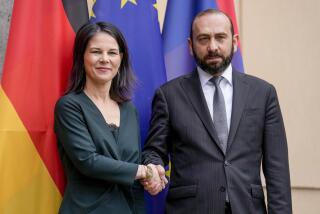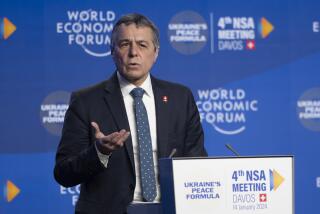Four WWII Allies Open Sessions to Reunify Germany : Europe: As historic talks begin, the foreign ministers approve concept of a single nation. But key issues of NATO ties and the status of Berlin are unresolved.
BONN — On a day heavy with history and rich in optimism, the principal World War II powers came together Saturday to plan the reunification of Germany and the beginning of a new European order.
In an atmosphere conspicuous in its level of mutual goodwill, the foreign ministers of the four victorious World War II Allies--the United States, the Soviet Union, Britain and France--and their counterparts from East and West Germany formally committed themselves to the principle of German unity and scheduled three additional meetings in Berlin, Paris and Moscow to negotiate the process.
“The Cold War is over,” declared Soviet Foreign Minister Eduard A. Shevardnadze.
Added Secretary of State James A. Baker III, “We meet in the recognition that a historical process is under way: the unification of Germany in peace and freedom.”
The negotiations, known as the “two-plus-four” talks, deal with the external aspects of unification, ensuring that the security interests of neighboring states are not eroded.
The talks will also formally end Allied rights in Germany that stem from World War II.
Despite the sense of history that dominated the day, the leaders settled none of the most sensitive issues surrounding German unity, such as the possible membership of a united Germany in the North Atlantic Treaty Organization, the way to end allied sovereignty in the former German capital of Berlin, and the military status of what is now East Berlin.
Those issues were put off for subsequent meetings.
In addition to the agenda itself, the six foreign ministers agreed only to invite Poland to attend the Paris meeting, scheduled for July, when the issue of Germany’s external frontiers will be discussed.
Poland had demanded to take part in the negotiations because of the acute sensitivity of the present German-Polish frontier, which runs along the Oder and Neisse rivers. About 44,000 square miles of land that was in Germany when the war began were ceded to Poland after the conflict.
Both Germanys have separately recognized the Oder-Neisse line, but under international law, only a united Germany can legally guarantee the border.
Both German foreign ministers on Saturday tried to reassure Poland.
“The crux is to give the Poles what they themselves feel serves their interests and guarantees their security,” East German Foreign Minister Markus Meckel said.
Added West German Foreign Minister Hans-Dietrich Genscher, “The Polish west border as laid down in . . . treaties should be the definitive border between Poland and Germany.”
Immediate breakthroughs on major issues were not expected here, and the upbeat atmosphere gave hope that myriad sensitive issues involved in the unity process can be resolved.
For the Germans themselves, the day seemed to confirm that unity really is an imminent fact.
“From this first meeting for the two-plus-four talks, the message goes out to those in both German states that the will of the Germans to unite in one state will be fulfilled,” Genscher declared. “For us, this is an emotional day.”
As he and other German leaders have consistently done in recent months, Genscher tried to allay concerns that unity might once again create an aggressive Germany.
“We will use the strength arising from our peaceful unification to the good of one Europe--united and free,” he pledged. “We wish to create not a German Europe but a European Germany.”
West Germany is already the dominant economic power in Europe, and unity plus the return of complete sovereignty to a united Germany are certain to give the country a political weight that will shift the balance of political power on the Continent.
Because of this, German unity has sparked discussions of ways of building a more united Europe by expanding the 35-nation Conference on Security and Cooperation in Europe (CSCE)--the only major organization that spans Europe’s old East-West divide.
The United States, Canada and all European nations but Albania are represented in the CSCE, which drafted the 1975 Helsinki Final Act guaranteeing basic human rights and ratifying existing postwar borders.
“Consideration is being given to expansion and strengthening of the CSCE,” Baker told a news conference after the meeting.
The six leaders appeared intent on maintaining the positive atmosphere, despite key differences between the Soviet Union and the other five.
On key points--such as the prospect of a united Germany within the North Atlantic Treaty Organization, where the Soviet Union finds itself in a minority of one--Shevardnadze clearly avoided public confrontation.
Moscow has strongly opposed NATO membership for a united Germany and has called variously for a new Germany to be neutral, nonaligned or even a member of both NATO and the Warsaw Pact.
On Saturday, however, Shevardnadze avoided any reference to Germany’s future military status in his opening remarks, then he dodged direct questions from reporters on the issue.
“I don’t think we should dramatize (our differences),” he said. “I can assure you the Soviet leadership is interested in working constructively with all European states to complete this historic process of building German unity.”
A senior U.S. official at the talks called attention to Shevardnadze’s efforts to avoid saying anything that would make Moscow appear obstructionist. “That was not an accident,” he said.
However, in the meeting itself, the Soviet foreign minister repeated Moscow’s stand that a united Germany must not join NATO.
“For us, NATO remains what it always was--an opposing military bloc with a doctrine based on the . . . possibility of a first (nuclear) strike,” he told the other foreign ministers.
Nevertheless, a senior U.S. official said the reunification process is being driven by Western values, something that might not have been possible a few years ago.
“In the past, when the Soviets talked about German unity, they were not talking about a democratic process,” the official said. “Now we have a chance to do it democratically.”
While Germans insist that NATO strategy reviews and East-West arms control agreements will transform the alliance into a predominantly political rather than military institution, Moscow still seems allergic to the idea of a united Germany as a member.
The fear of Germany is deeply ingrained in the Soviet psyche, and Germany’s postwar division and continued stationing of Soviet troops there is considered by the Soviets to be a triumph of their foreign policy.
Consequently, opposition to unity is strong, especially within the military and among conservatives.
U.S. officials believe, however, that there is little Moscow can do to block either unification or German membership in NATO.
Genscher noted that the Helsinki Final Act guarantees every state the right to make its own decisions on whether to join any alliance.
Senior U.S. officials said that the Soviet Union could, if it wished, stall the two-plus-four process, but even if this ended in deadlock, that could not prevent either German reunification or German membership in NATO.
“By not acting, the rest of the world does not stop,” one official said.
More to Read
Sign up for Essential California
The most important California stories and recommendations in your inbox every morning.
You may occasionally receive promotional content from the Los Angeles Times.










